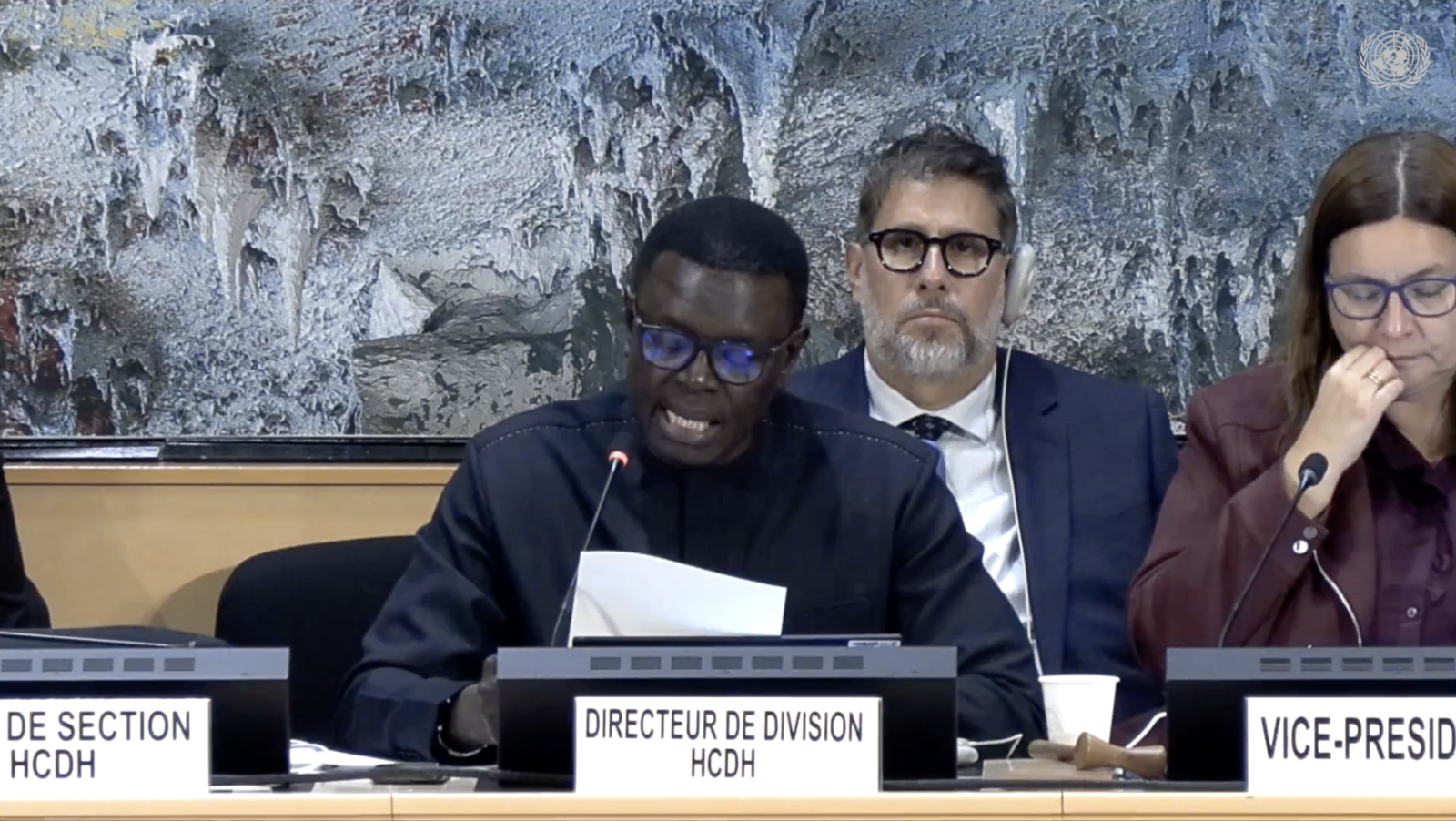 Building accountability amid conflict in Yemen
Building accountability amid conflict in Yemen
60th session of the Human Rights Council
8 September - 8 October 2025
Item 10: Presentation of the High Commissioner's country report on Yemen, followed by General Debate
3 October 2025
By Astrid Bochnakian / GICJ
Executive Summary
During the 60th session of the Human Rights Council, on 3 October 2025, the Office of the High Commissioner for Human Rights (OHCHR) presented its report on Yemen under Agenda Item 10, reviewing technical assistance provided to the National Commission of Inquiry (NCI) between September 2024 and August 2025. The report and ensuing debate highlighted the worsening human rights situation across the country, marked by increasing repression, widespread arbitrary detentions, restrictions on civic space, and the persecution of journalists, human rights defenders, and religious minorities in areas controlled by the de facto Houthi authorities. The continued detention of UN and NGO staff was widely condemned as a violation of international law and emblematic of the broader culture of impunity in Yemen.
Despite the challenging environment, the NCI remains a key national mechanism working towards accountability and transitional justice. With OHCHR’s support, the Commission continued investigations, field missions, and capacity-building activities to document abuses by all parties. However, its ability to operate effectively is constrained by limited funding, insecurity, and a lack of cooperation from the de facto authorities. Delegations and civil society participants reaffirmed the importance of technical assistance and capacity-building, while stressing that these must be accompanied by political commitment and structural reform to address the root causes of Yemen’s protracted crisis.
Geneva International Centre for Justice (GICJ) welcomes the High Commissioner’s report and echoes calls for stronger protection, accountability, and humanitarian action. GICJ expresses grave concern over the continuing violations by all parties, particularly the Houthis, and emphasises that capacity-building cannot substitute for accountability. The organisation urges the Council, OHCHR, and the international community to:
- Strengthen human rights monitoring through secure and independent reporting mechanisms in Houthi-controlled areas;
- Support accountability and transitional justice by training prosecutors, legal professionals, and civil society actors to manage evidence and assist victims;
- Promote regional and international cooperation to enforce sanctions and enable prosecution of serious violations through international or hybrid mechanisms;
- Enhance humanitarian access by providing technical assistance to the Internationally Recognised Government to ensure aid reaches civilians without legitimising armed groups;
- Foster conflict resolution and peace-building through inclusive initiatives and integration of human rights safeguards into peace negotiations and post-conflict recovery plans.
GICJ reiterates that sustainable peace in Yemen requires justice, accountability, and respect for human dignity. Technical assistance must serve as a foundation for a rights-based transition to peace, ensuring that the suffering of the Yemeni people gives rise not to impunity, but to lasting reconciliation and reform.
Background
In 2011, tens of thousands of Yemenis took to the streets to call for the resignation of President Ali Abdullah Saleh, who had ruled the country for over three decades. The demonstrations, which were part of the broader wave of protests known as the Arab Spring, initially peaceful, were met with violence by security forces, leading to widespread human rights violations and political instability. After months of unrest and mounting pressure from domestic and regional actors, Saleh agreed to step down in November 2011 under a Gulf Cooperation Council-brokered deal, transferring power to his deputy, Abd-Rabbu Mansour Hadi. Although the transition was intended to pave the way for democratic reform, unresolved grievances, economic decline, and the fragmentation of state institutions created conditions that would later fuel the escalation of conflict and the country’s descent into war.
In September 2014, after organising protests reflecting popular dissatisfaction, the Houthi movement, a militia which has long opposed the Saleh regime, seized the capital, Sana’a, before orchestrating a coup d’État in January 2015 and ousting President Hadi. The militia then dissolved the Parliament and took over all governmental institutions in the North of the country, including the national bank and State-led media. President Hadi fled to Aden, forming a government in exile backed by Saudi Arabia. Since then, Yemeni Internationally Recognised Government forces and the Saudi-led Arab coalition have been locked in a stalemate with Houthi-aligned forces.
The consequences of the crisis on the Yemeni population are massive, with prolonged social and economic effects. The conflict with the Houthi militia has resulted in over 5 million internally displaced individuals, 90% of whom still reside in areas under the control of the militia. —They are facing adversities such as a severe famine, the lack of necessities, including safe drinking water, poor health, limited access to education and professional opportunities, insecurity and violence, and limited access to humanitarian assistance. Those factors constitute violations of the economic, social and cultural rights of the Yemeni people.
In this context, the National Commission of Inquiry (NCI) was established by presidential decree in 2012 to investigate human rights violations committed during the 2011 uprising. Its mandate was later expanded to include all violations of international human rights and humanitarian law by all parties to the conflict since 2011. Based in Aden, the Commission is mandated to operate with a small team of commissioners, investigators, and field monitors who document abuses, interview victims and witnesses, and refer cases to judicial authorities. Despite persistent resource constraints and the lack of cooperation from de facto authorities controlling parts of Yemen, the NCI remains one of the few functioning national mechanisms seeking to promote accountability and justice amid the ongoing conflict. The mandate of the NCI was renewed in July 2025 for three additional years.
Additionally, the Office of the High Commissioner for Human Rights (OHCHR) has played a crucial role in providing technical assistance to strengthen national institutions, promote accountability, and protect human rights in Yemen since 2012. The OHCHR has a field office in Sana’a and a sub-office in Aden, with staff deployed in various governorates to support their work. For instance, it supports the National Commission of Inquiry, enabling it to investigate human rights violations and abuses in Yemen, and it works to enhance the capacity of Yemeni institutions and individuals in international human rights and humanitarian law, including by advising the Internationally Recognised Government on strategies, programs, and measures to promote and protect human rights. Yet, UN staff based in Sana’a face persistent threats and intimidation by the Houthi authorities, including arrest and arbitrary detention despite their diplomatic immunity, thus severely hindering their ability to deliver technical assistance and capacity building.
Summary of the High Commissioner’s report (A/HRC/60/85)
The report presented by the UN High Commissioner for Human Rights pursuant to resolution 57/3 reviews the technical support provided to Yemen’s NCI (NCI) between September 2024 and August 2025. Despite its continued operations and engagement with Yemeni authorities, the Commission has faced serious obstacles, particularly a lack of cooperation from the de facto authorities controlling parts of the country.
The human rights situation in Yemen continued to deteriorate throughout the reporting period, marked by restrictions on civic space, the suppression of independent media, and widespread intimidation of journalists and activists. The detention of UN and NGO personnel by the de facto authorities further highlighted the prevailing culture of impunity. Nevertheless, the NCI carried out investigations across government-controlled areas, including visits to 19 detention facilities, field missions, and meetings with victims, witnesses, and civil society actors. These efforts reflect its role as one of the few national mechanisms actively documenting violations and pursuing accountability amid ongoing conflict.
Throughout the year, OHCHR continued to provide the NCI with training and capacity-building assistance, albeit on a reduced scale due to UN budget constraints. Workshops were held to strengthen the skills of investigators, field monitors, and civil society representatives in documentation, reporting, and transitional justice. OHCHR also supported the NCI’s participation in international forums to enhance its visibility and cooperation with global stakeholders.
The report underscores that while the NCI’s work remains critical, its impact is limited by insufficient resources, political obstruction, and the broader instability of the country. The High Commissioner calls on all parties to the conflict to cooperate fully with the Commission, on the Yemeni Government to secure its independence and funding, and on the international community to continue providing technical and financial support. Ultimately, strengthening the NCI and embedding its work within a broader transitional justice framework are seen as vital steps towards accountability, reconciliation, and sustainable peace in Yemen.
Summary of the discussion
Presentation of the High Commissioner’s report
 Presenting report A/HRC/60/85, Mr. Abdoul Aziz Thioye, Deputy Director of the Global Operations Division of OHCHR, stressed that technical assistance in Yemen remains critical, especially in areas under de facto authority control. He emphasised the restrictions of civic space and humanitarian operations. He called for the immediate and unconditional release of the 8 OHCHR staff arbitrarily detained by the de facto Houthi authority. Mr. Thioye particularly commended the work of the NCI and its contribution to the peace effort, but stressed that the UN liquidity crisis has hindered full implementation of mandated activities in Yemen. He reminded the Council that OHCHR provided technical cooperation through training, focusing on strengthening engagement between the commission and civil society to promote human rights.
Presenting report A/HRC/60/85, Mr. Abdoul Aziz Thioye, Deputy Director of the Global Operations Division of OHCHR, stressed that technical assistance in Yemen remains critical, especially in areas under de facto authority control. He emphasised the restrictions of civic space and humanitarian operations. He called for the immediate and unconditional release of the 8 OHCHR staff arbitrarily detained by the de facto Houthi authority. Mr. Thioye particularly commended the work of the NCI and its contribution to the peace effort, but stressed that the UN liquidity crisis has hindered full implementation of mandated activities in Yemen. He reminded the Council that OHCHR provided technical cooperation through training, focusing on strengthening engagement between the commission and civil society to promote human rights.
Mr. Thioye recommended that the NCI continue building its capacity to investigate human rights violations by all parties and deepen its engagement with civil society, particularly in transitional justice and accountability. Finally, he stressed that OHCHR remains committed to supporting the NCI through assistance and advice to contribute to a human-rights-based transition to peace and reconciliation.
Statement of the country concerned: Yemen
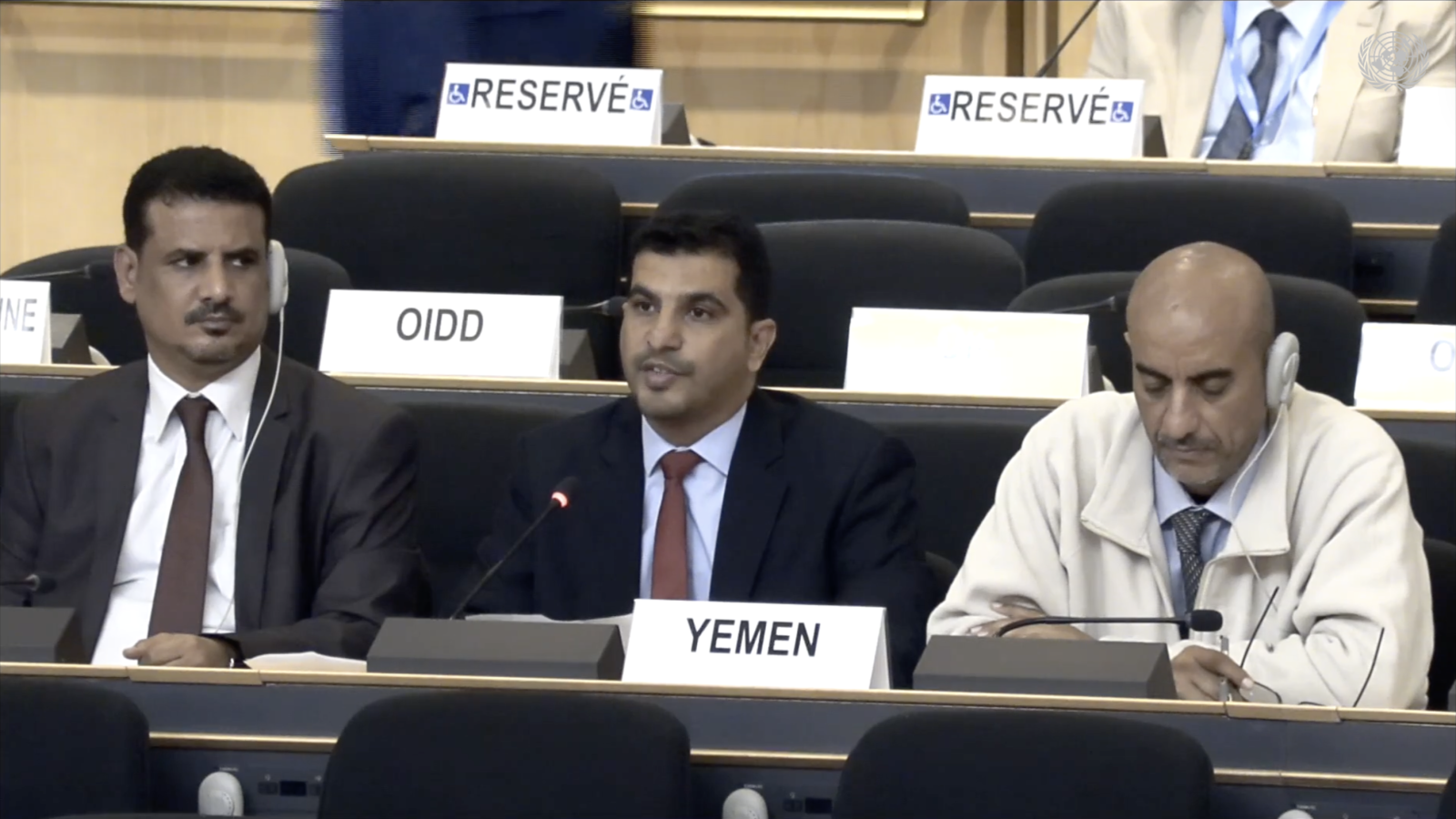 The delegate of Yemen expressed deep appreciation for the efforts deployed by OHCHR in preparing its report on the NCI investigation, as well as appreciation for the update. He stressed the importance of the role of the NCI in allegations of violations, and supported it as an independent, neutral and efficient mechanism. Reminding the Council of the Yemeni Internationally Recognised Government’s cooperation with the NCI, he aligned with the Council’s resolution. He stressed that the government launched an inclusive reform to achieve peace and stability, centring the national agenda on human rights and extending the mandate of the NCI for three additional years. He underlined that this reflects a willingness to ensure justice and development for Yemenis.
The delegate of Yemen expressed deep appreciation for the efforts deployed by OHCHR in preparing its report on the NCI investigation, as well as appreciation for the update. He stressed the importance of the role of the NCI in allegations of violations, and supported it as an independent, neutral and efficient mechanism. Reminding the Council of the Yemeni Internationally Recognised Government’s cooperation with the NCI, he aligned with the Council’s resolution. He stressed that the government launched an inclusive reform to achieve peace and stability, centring the national agenda on human rights and extending the mandate of the NCI for three additional years. He underlined that this reflects a willingness to ensure justice and development for Yemenis.
The Yemeni delegate condemned human rights violations perpetrated by the Houthi militia and their arbitrary arrest of political opponents, the prosecution of human rights defenders and the discrimination against women, stressing that those violations reflect the Houthis’ refusal of the ceasefire and hinder efforts towards peace. He urged the international community and the Council to support the Internationally Recognised Government’s economic reforms and to put an end to human rights violations perpetrated by the Houthi militia, including arbitrary arrests. He further called for the immediate release of all abductees and detainees, particularly the humanitarians, but stressed the need to protect critical fields and allow the Government to export oil, in order to reinforce nationwide stability.
The delegate concluded his intervention by stressing the need to provide technical support and assistance and to build capacity to live up to human rights commitments. He called for reinforcing the work of the NCI for it to fulfil its mandate, in line with the Arab Group-sponsored draft resolution under item 10. He finally underscored Yemen’s interest in reinforcing cooperation between OHCHR and the Council’s members to protect human rights and achieve a peaceful future.
Statements of Countries
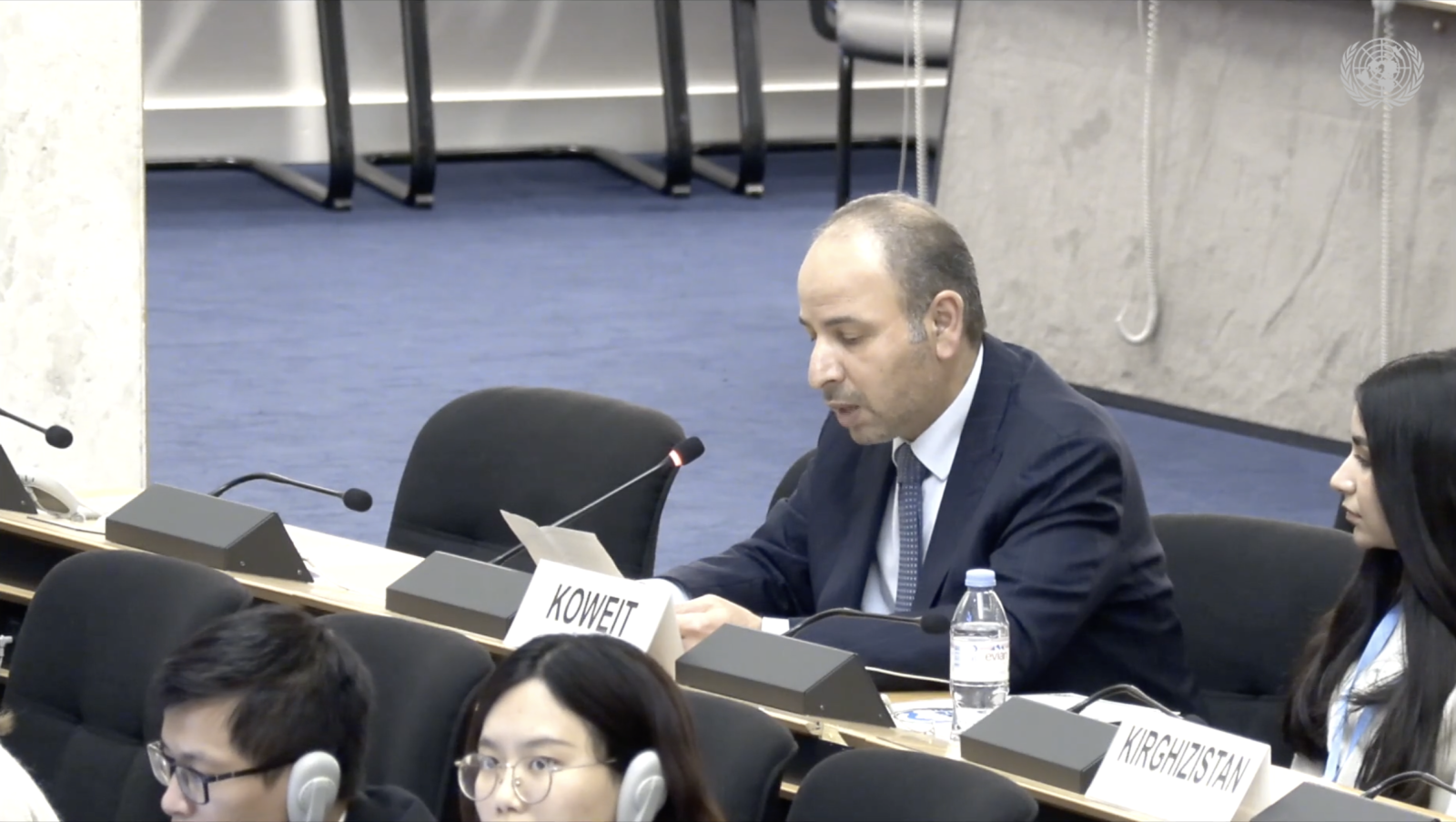 The delegate of Kuwait, speaking on behalf of the Gulf Cooperation Council (GCC), commended the publication of the NCI report and the support the Commission received.
The delegate of Kuwait, speaking on behalf of the Gulf Cooperation Council (GCC), commended the publication of the NCI report and the support the Commission received.
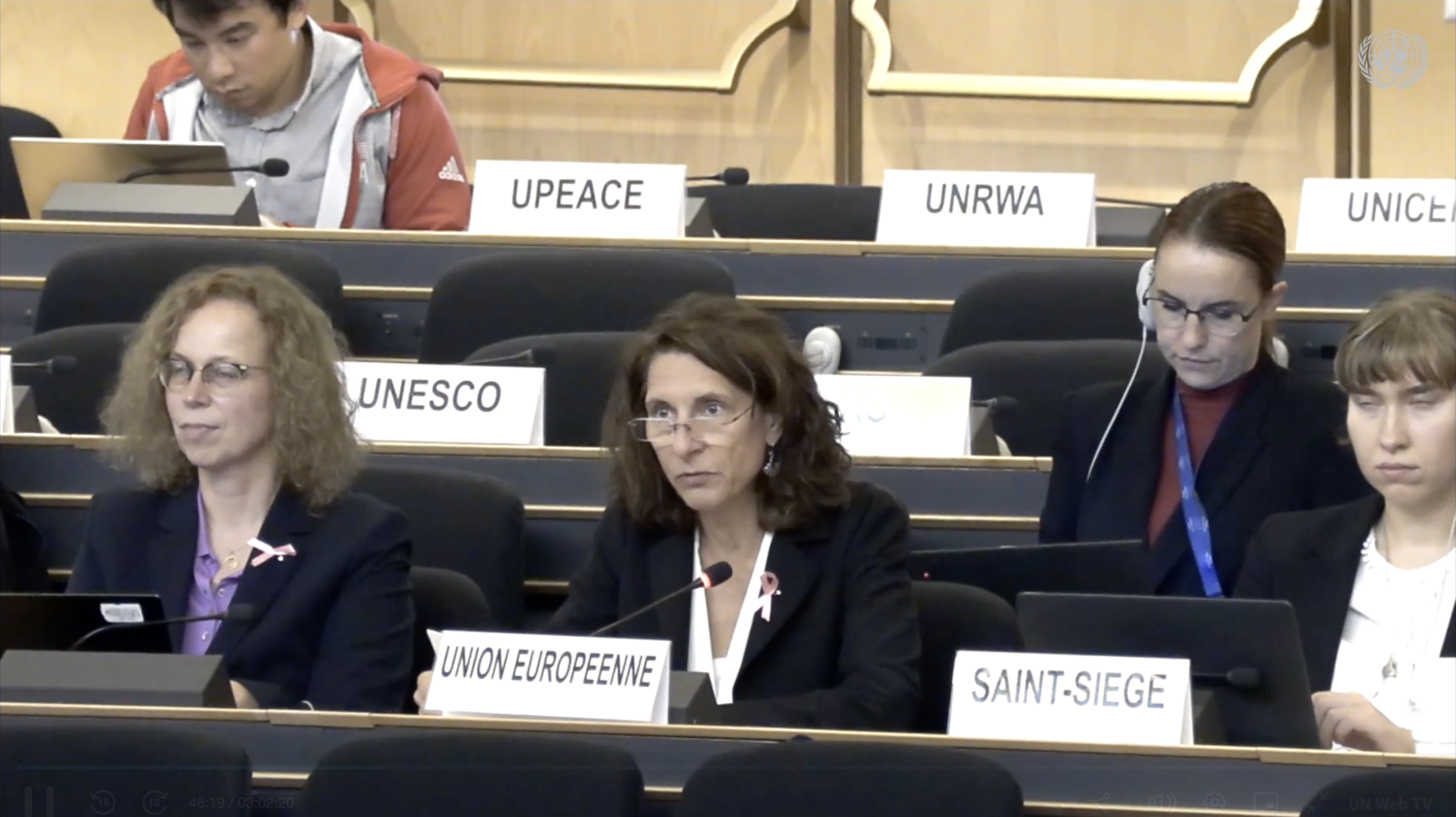 The delegate of the European Union, in a statement with which Albania, North Macedonia, Montenegro and the Republic of Moldova align, strongly condemned HR violations in Yemen, particularly in Houthi-controlled areas. She reiterated the EU’s continued support for the capacity building of the NCI, but stressed that the current mandate is not sufficient. She called the Council to discuss the deteriorating situation based on an independent OHCHR report.
The delegate of the European Union, in a statement with which Albania, North Macedonia, Montenegro and the Republic of Moldova align, strongly condemned HR violations in Yemen, particularly in Houthi-controlled areas. She reiterated the EU’s continued support for the capacity building of the NCI, but stressed that the current mandate is not sufficient. She called the Council to discuss the deteriorating situation based on an independent OHCHR report.
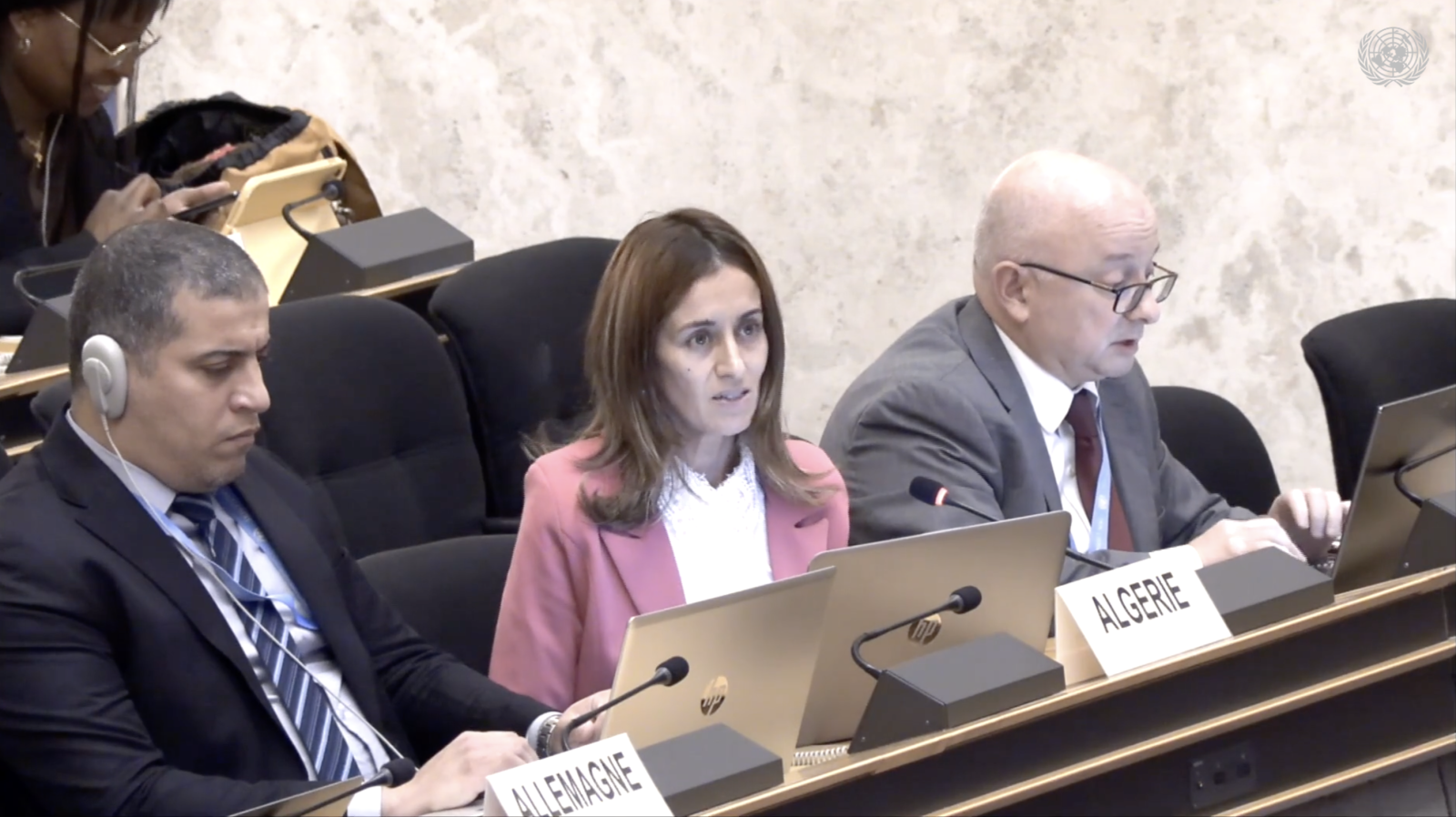 The delegate of Algeria, speaking on behalf of a group of Arab States, commended the efforts made by OHCHR and other UN bodies. She stressed the colossal challenges faced by several countries, including Yemen, which deserve the attention of the Council and OHCHR beyond the liquidity crises.
The delegate of Algeria, speaking on behalf of a group of Arab States, commended the efforts made by OHCHR and other UN bodies. She stressed the colossal challenges faced by several countries, including Yemen, which deserve the attention of the Council and OHCHR beyond the liquidity crises.
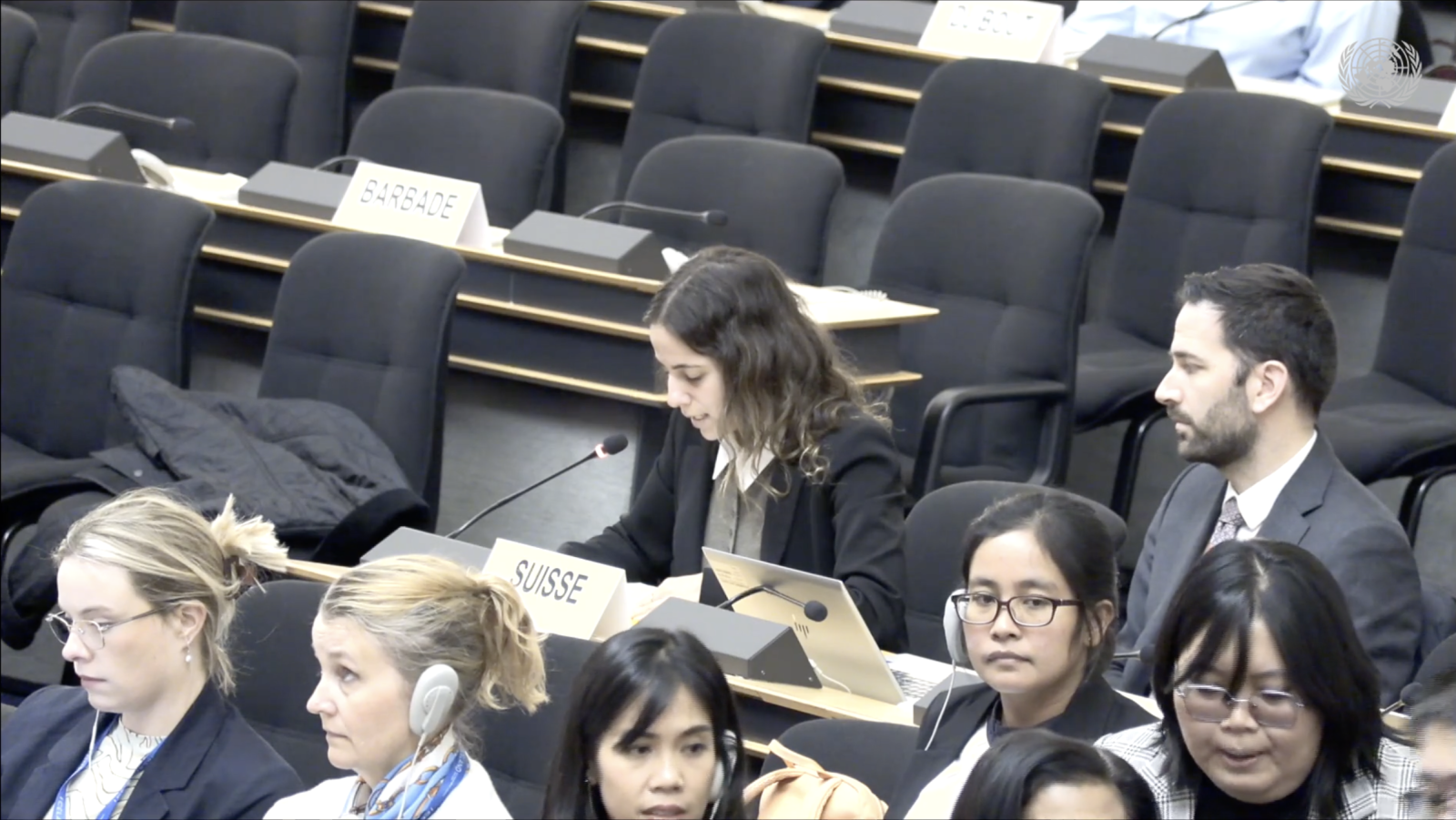 The delegate of Switzerland thanked the High Commissioner for his report on technical assistance in Yemen and called for all stakeholders to implement the recommendations. She stressed the further deterioration of the human rights situation, including arbitrary arrest, restrictions on freedom of expression and abuse of the rights of women and children. She called on all parties to the conflict to ensure the unimpeded access of humanitarian aid. Switzerland condemned the arrest and arbitrary detention of UN workers, NGOs and civil society actors in Sana’a and called for their immediate and unconditional release. She also condemned the forced entry into UN premises, stressing that UN personnel should be protected at all times, and calling for a political solution to the conflict and respect for human rights.
The delegate of Switzerland thanked the High Commissioner for his report on technical assistance in Yemen and called for all stakeholders to implement the recommendations. She stressed the further deterioration of the human rights situation, including arbitrary arrest, restrictions on freedom of expression and abuse of the rights of women and children. She called on all parties to the conflict to ensure the unimpeded access of humanitarian aid. Switzerland condemned the arrest and arbitrary detention of UN workers, NGOs and civil society actors in Sana’a and called for their immediate and unconditional release. She also condemned the forced entry into UN premises, stressing that UN personnel should be protected at all times, and calling for a political solution to the conflict and respect for human rights.
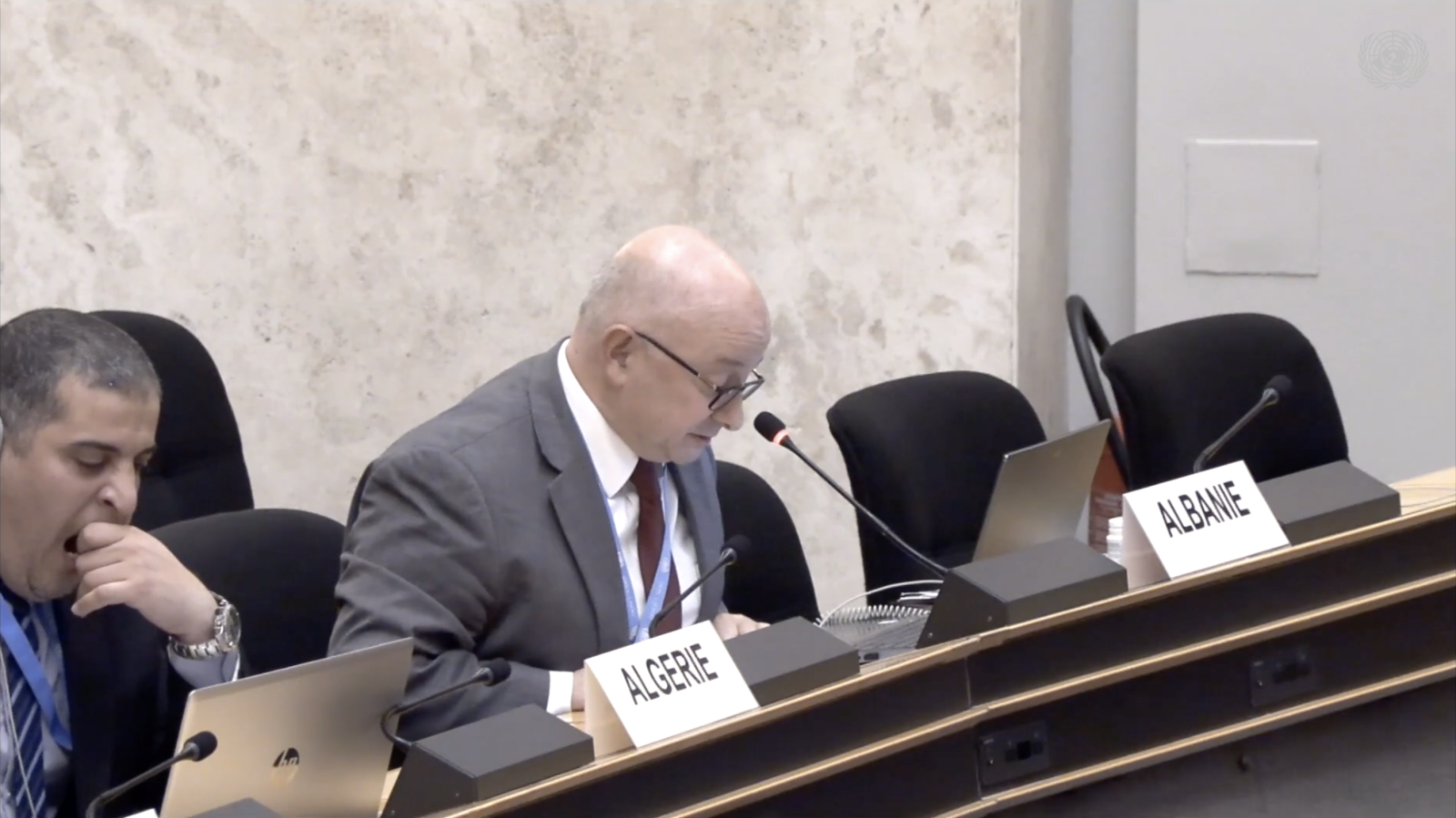 The delegate of Albania thanked the High Commissioner for his report and underlined that capacity-building is a key tool of the Council. He stressed the impact of the protracted conflict on the humanitarian situation in Yemen, requiring capacity-building and protection of civilians. He encouraged full cooperation with OHCHR, stressing that the participation of the State concerned and civil society is vital for the improvement of human rights and for building resilient institutions.
The delegate of Albania thanked the High Commissioner for his report and underlined that capacity-building is a key tool of the Council. He stressed the impact of the protracted conflict on the humanitarian situation in Yemen, requiring capacity-building and protection of civilians. He encouraged full cooperation with OHCHR, stressing that the participation of the State concerned and civil society is vital for the improvement of human rights and for building resilient institutions.
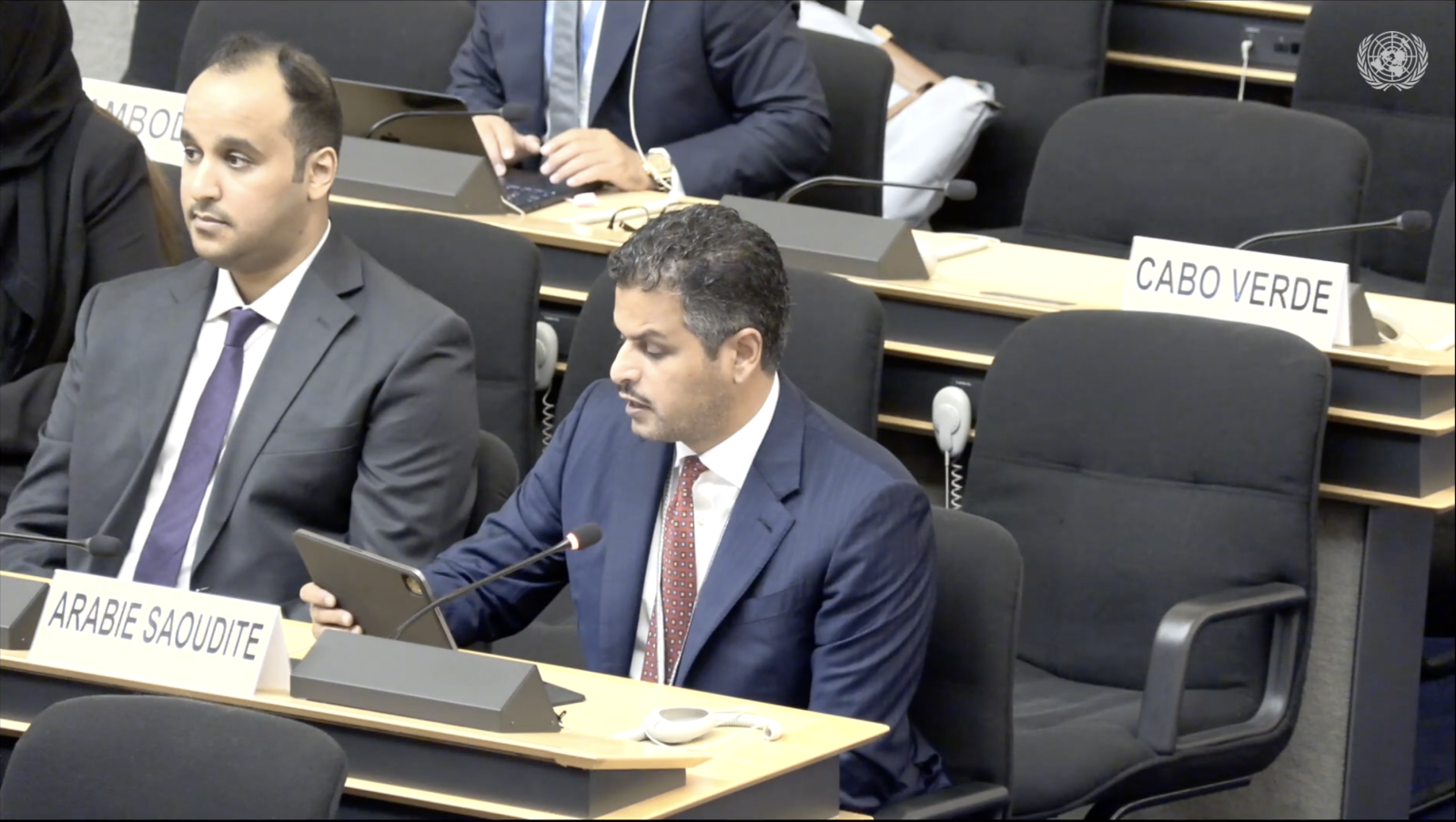 The delegate of Saudi Arabia stressed the great importance of capacity building in Yemen, which enables national institutions to carry out their mandate of protecting human rights without politicisation. He expressed concerns over the great violations by the Houthis, including assaults against UN staff. The delegate stressed that Saudi Arabia provides humanitarian, development and economic support to Yemen, which he stressed allows the stability of the Yemeni economy and the country’s security.
The delegate of Saudi Arabia stressed the great importance of capacity building in Yemen, which enables national institutions to carry out their mandate of protecting human rights without politicisation. He expressed concerns over the great violations by the Houthis, including assaults against UN staff. The delegate stressed that Saudi Arabia provides humanitarian, development and economic support to Yemen, which he stressed allows the stability of the Yemeni economy and the country’s security.
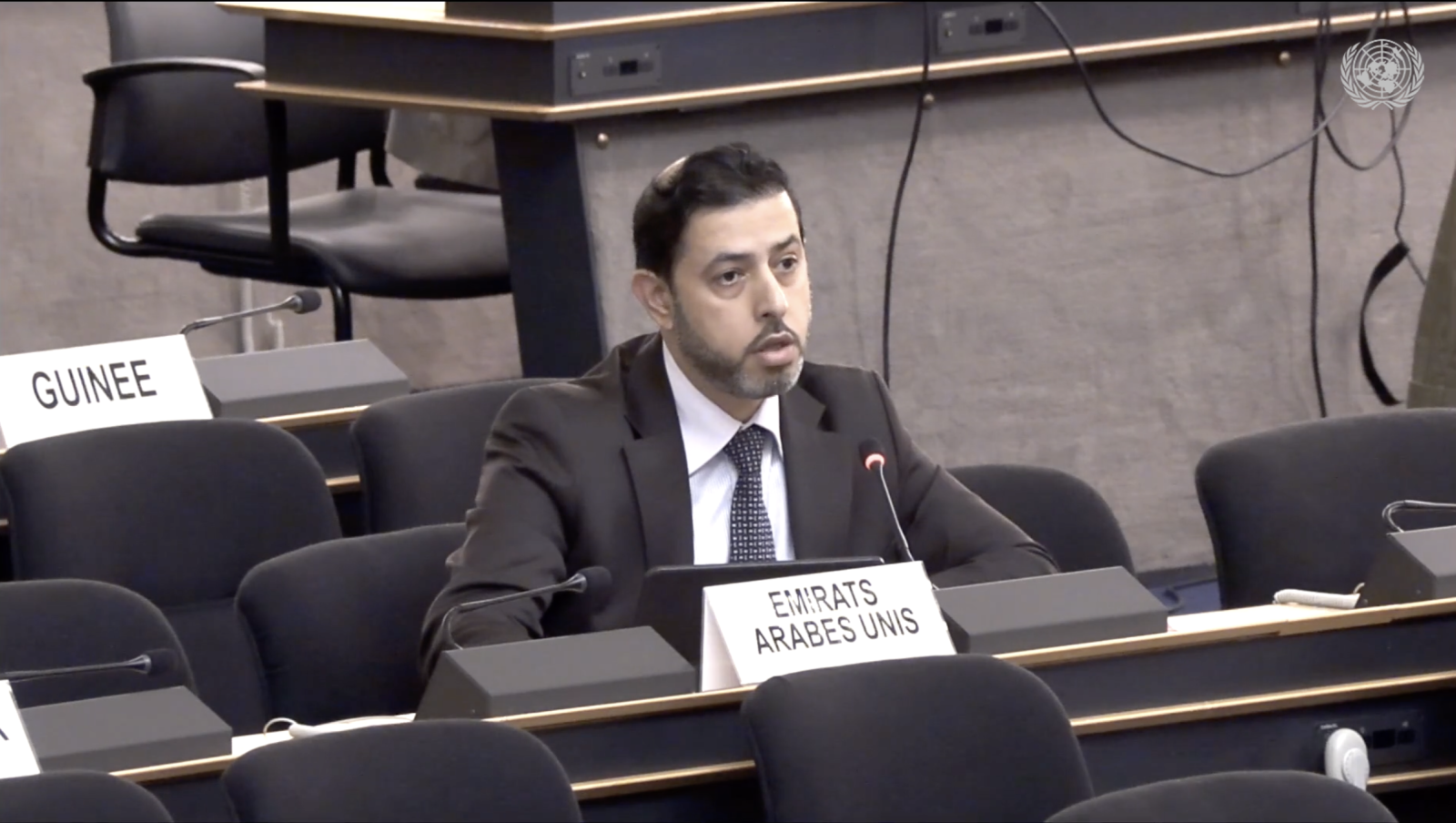 The delegate of the United Arab Emirates thanked OHCHR for the technical assistance provided to the government of Yemen and welcomed the NCI report on the human rights violations in Yemen. He welcomed efforts taken by OHCHR to meet the growing need for technical assistance and capacity building, and the assistance to strengthen national institutions. He called to ensure that there are enough resources to allow all UN bodies to support States and ensure they can appropriately progress to meet the SDGs.
The delegate of the United Arab Emirates thanked OHCHR for the technical assistance provided to the government of Yemen and welcomed the NCI report on the human rights violations in Yemen. He welcomed efforts taken by OHCHR to meet the growing need for technical assistance and capacity building, and the assistance to strengthen national institutions. He called to ensure that there are enough resources to allow all UN bodies to support States and ensure they can appropriately progress to meet the SDGs.
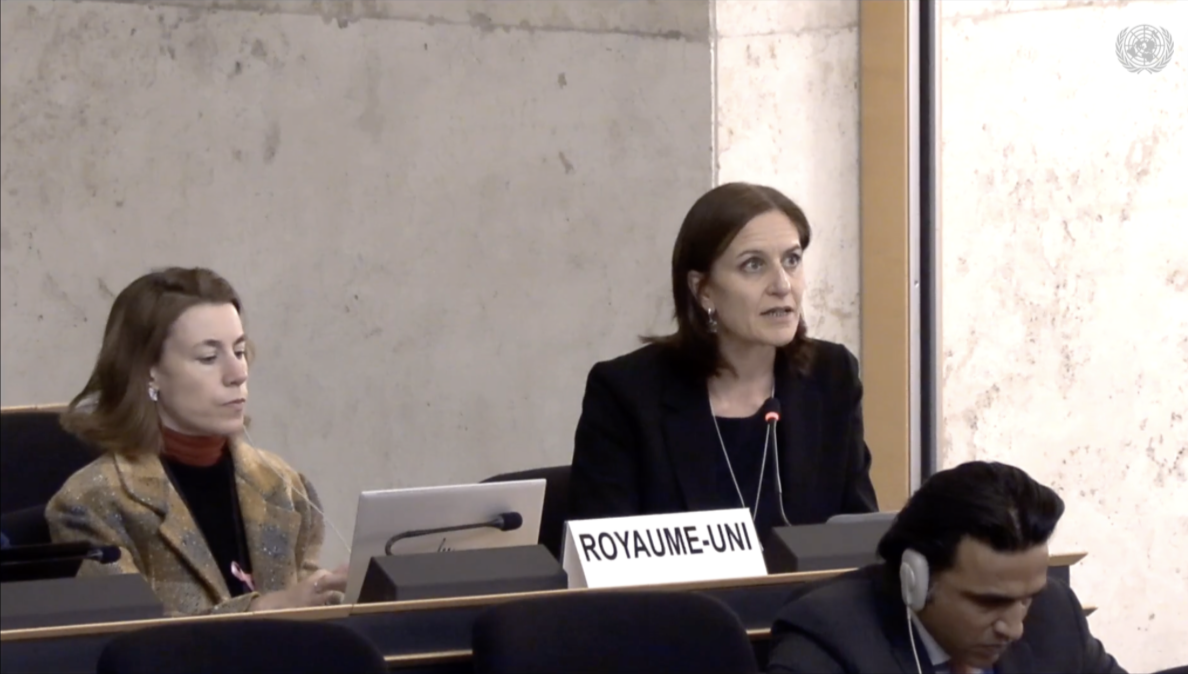 The delegate of the United Kingdom reiterated her concerns over the seriousness and scale of human rights violations in Yemen, including growing restrictions on women and their freedom of movement, forced marriage, sexual violence and attacks against the freedom of religion and belief. She condemned arbitrary detention by the Houthis, including of UN personnel, humanitarian workers and NGO staff, as well as indiscriminate attacks on civilians and civilian infrastructures. She called on all parties to the conflict to respect their human rights obligations.
The delegate of the United Kingdom reiterated her concerns over the seriousness and scale of human rights violations in Yemen, including growing restrictions on women and their freedom of movement, forced marriage, sexual violence and attacks against the freedom of religion and belief. She condemned arbitrary detention by the Houthis, including of UN personnel, humanitarian workers and NGO staff, as well as indiscriminate attacks on civilians and civilian infrastructures. She called on all parties to the conflict to respect their human rights obligations.
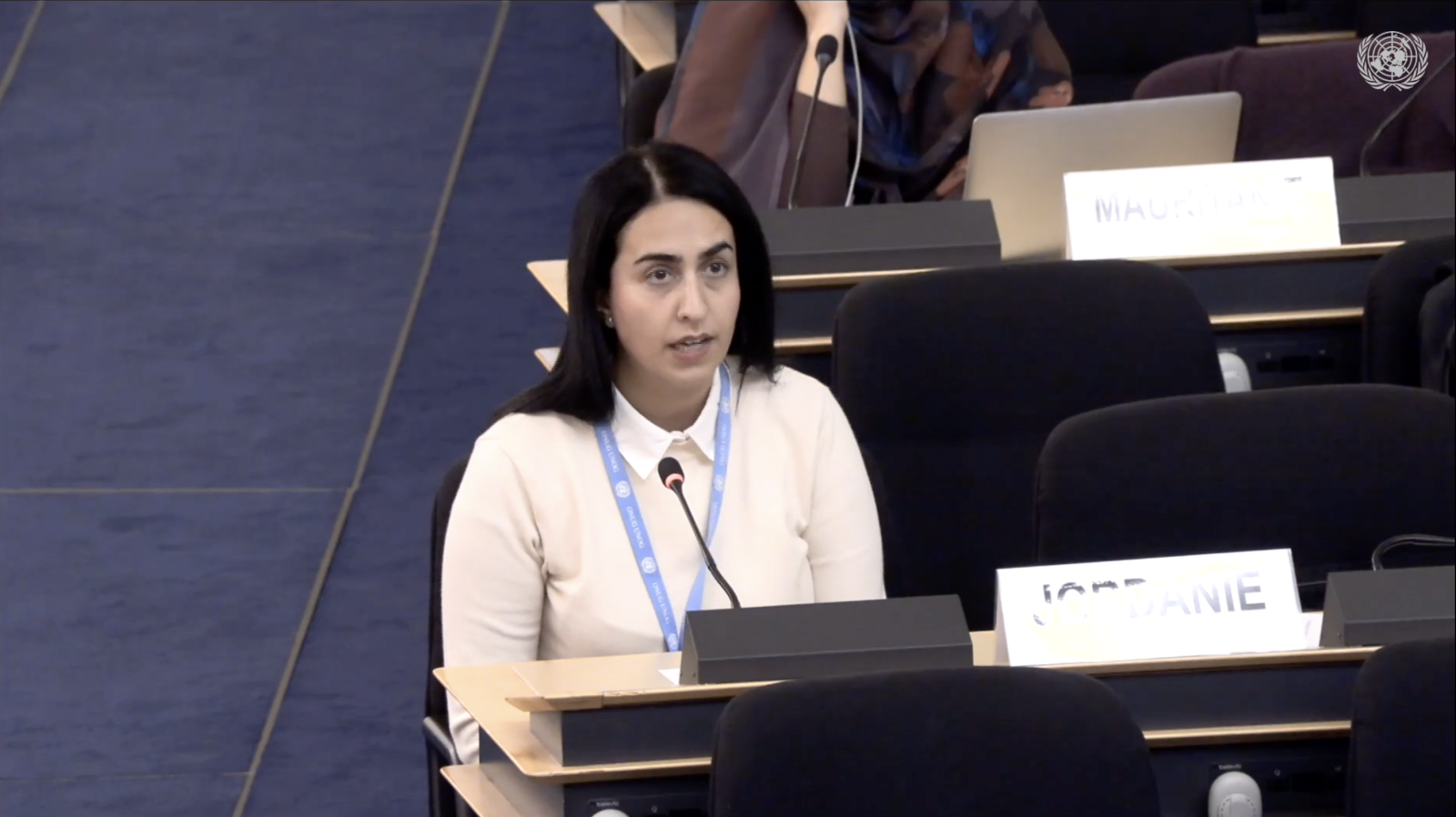 The delegate of Jordan thanked the High Commissioner for his report, which highlights, according to her, the importance of a collaborative and constructive approach to promote and protect human rights. She reiterated Jordan’s interest in the work of the NCI and stressed the persisting challenges in terms of accountability and justice. She called on OHCHR to pursue the capacity building and technical assistance to the NCI to fully discharge its mandate in full independence. She stressed that agenda item 10 is key in the Council’s work since it provides a non-politicised and targeted cooperation platform and allows for capacity building.
The delegate of Jordan thanked the High Commissioner for his report, which highlights, according to her, the importance of a collaborative and constructive approach to promote and protect human rights. She reiterated Jordan’s interest in the work of the NCI and stressed the persisting challenges in terms of accountability and justice. She called on OHCHR to pursue the capacity building and technical assistance to the NCI to fully discharge its mandate in full independence. She stressed that agenda item 10 is key in the Council’s work since it provides a non-politicised and targeted cooperation platform and allows for capacity building.
Statements of National Human Rights Institutions (NHRIs) and Non-Governmental Organisations (NGOs)
NGOs expressed deep concern over the deteriorating human rights situation in Yemen, condemning the widespread use of arbitrary detention to silence dissent and instil fear. They stressed that genuine capacity-building must begin with respect for human dignity and fundamental freedoms, urging the Council to adopt strategies that go beyond technical cooperation to address the entrenched political structures driving the conflict. Several organisations denounced violations of freedom of religion and belief in Houthi-controlled areas, particularly the persecution of the Baha’i community through arbitrary arrests, enforced disappearances, torture, exile, and death sentences. The arbitrary detention of UN staff, human rights defenders, and journalists, amid increasing repression of freedom of expression by all authorities, was also strongly condemned. Speakers called for accountability for all parties and for the establishment of a robust investigation and accountability mechanism, arguing that the measures in the draft resolution remain insufficient. They further criticised Israeli attacks on Yemeni civilians in Sana’a for exacerbating an already dire humanitarian crisis. While highlighting the ongoing violations since the Houthi coup, several organisations reaffirmed the need for continued technical assistance to support investigative efforts and empower civil society as a crucial oversight mechanism.
Conclusion
The presentation of the High Commissioner’s report and the ensuing interactive dialogue underlined both the urgency of Yemen’s human rights crisis and the importance of sustained international engagement under Item 10. Despite years of conflict and institutional fragility, the National Commission of Inquiry remains a cornerstone in Yemen’s pursuit of accountability and transitional justice. However, its work continues to be hampered by limited resources, political obstruction, and the persistent lack of cooperation from the de facto authorities. The interventions made during the debate reflected a broad consensus among States and NGOs on the need to strengthen the Commission’s independence and capacity while ensuring that technical assistance is accompanied by genuine political will to end impunity.
Speakers also highlighted the worsening repression across the country, particularly in areas under Houthi control, where arbitrary arrests, restrictions on freedom of expression, and violations of the rights of women, journalists, and religious minorities persist. The arbitrary detention of UN and NGO personnel was widely condemned as emblematic of the broader collapse of respect for international norms. Amid these challenges, delegations repeatedly affirmed that technical cooperation must go hand in hand with concrete accountability measures and structural reforms to address the root causes of Yemen’s protracted conflict.
In this context, the discussion reaffirmed the value of technical assistance and capacity-building as vital tools of the Human Rights Council to accompany States in their human rights commitments. Yet, as emphasised by several participants, capacity-building alone is not sufficient. The path towards justice, peace, and reconciliation in Yemen requires sustained support to national mechanisms such as the NCI, strengthened cooperation with OHCHR, and the political determination of all parties to uphold human rights and humanitarian principles. The Council and the international community must therefore maintain close attention to Yemen, ensuring that the protection of human dignity and accountability for violations remain at the heart of all future engagement.
Position of Geneva International Centre for Justice
Geneva International Centre for Justice (GICJ) remains gravely concerned by the persistent and widespread human rights violations committed by all parties to the conflict in Yemen, particularly by the de facto Houthi authorities. The continued use of arbitrary detention, enforced disappearance, intimidation of journalists, lawyers, and human rights defenders, and persecution of religious minorities reflects a systematic erosion of civic space and the rule of law. The arbitrary arrest and detention of United Nations staff, humanitarian workers, and members of civil society are flagrant violations of international law and demonstrate the urgent need for stronger accountability mechanisms.
GICJ recognises the crucial work of the National Commission of Inquiry (NCI) as a key mechanism striving to document and investigate human rights abuses. Its efforts to promote accountability, engage with victims, and contribute to a future transitional justice process are commendable. However, the Commission’s capacity to fulfil its mandate is severely limited by resource constraints, restricted access to certain territories, and the absence of cooperation from the de facto authorities. We thus stress that national accountability mechanisms cannot succeed in isolation and must be supported through adequate funding, political backing, and technical assistance from the international community.
GICJ urges the Human Rights Council, the Office of the High Commissioner for Human Rights, and the international community to take the following actions:
- Strengthen human rights monitoring and documentation by developing secure and independent reporting mechanisms for abuses in Houthi-controlled areas, without requiring direct engagement with the militia, to protect victims and witnesses while ensuring reliable data collection.
- Support accountability and transitional justice by facilitating capacity-building programmes for prosecutors, legal professionals, and civil society actors to enhance their ability to manage evidence, conduct fair investigations, and provide legal and psychosocial support to victims.
- Promote regional and international cooperation to support the enforcement of sanctions against the Houthi leadership and to enable the prosecution of serious human rights abuses and war crimes through international or hybrid mechanisms.
- Enhance humanitarian access by providing technical support to the Internationally Recognised Government of the Republic of Yemen to secure safe and unhindered delivery of humanitarian aid in Houthi-controlled areas, and by exerting pressure on the de facto authorities to allow assistance to reach civilians without conferring legitimacy on the militia.
- Promote conflict resolution and peace-building through initiatives aimed at ending the conflict, addressing root causes, and fostering inclusive dialogue involving women, youth, and civil society actors.
- Integrate human rights protections into peace negotiations and post-conflict recovery planning by providing technical advice to ensure that transitional frameworks uphold justice, equality, and the rights of all Yemenis.
GICJ reiterates that technical assistance must not be a substitute for accountability, but rather a foundation for a comprehensive, rights-based transition to peace. The international community must remain engaged in Yemen, ensuring that human dignity, justice, and accountability are central to all future political and humanitarian efforts. Sustainable peace will only be achieved when those responsible for grave violations are held to account and when the rights of victims are fully upheld.




